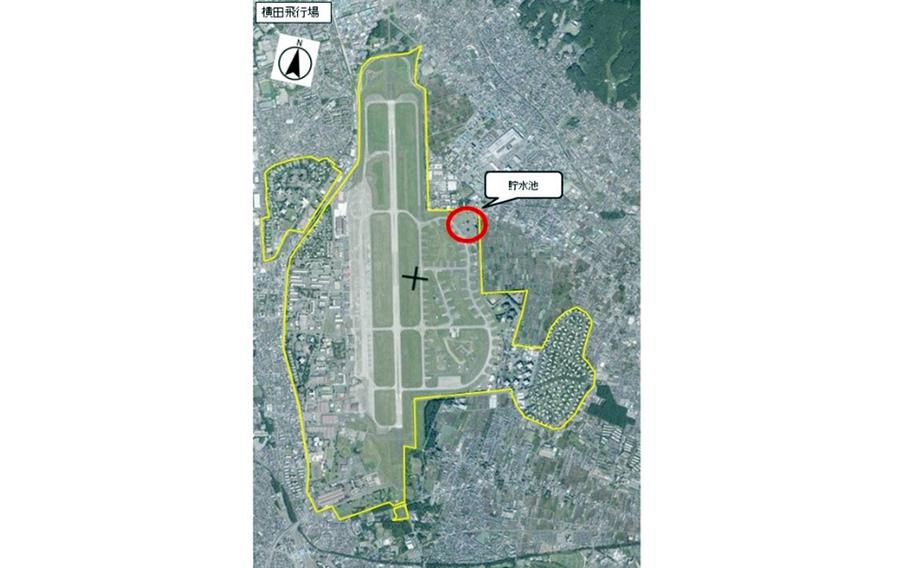
On this map of Yokota Air Base in western Tokyo, a circle marks the location of a reservoir holding PFAS-contaminated water, and a cross shows the location of the firefighter training facility. (Japan’s Ministry of Defense)
YOKOTA AIR BASE, Japan — The Japanese government on Friday gave the U.S. military the green light to release about 400,000 gallons of treated water from this airlift hub in western Tokyo.
Japanese officials collected treated water samples during a May 14 visit to Yokota. Air Force officials also briefed them on plans to reduce the contamination and discharge the water from the base, according to a statement Friday from the ministries of Defense, Foreign Affairs and the Environment.
The water had been contaminated with PFOS and PFOA — toxic chemicals once found in firefighting foam used by the military — and was being stored in a reservoir and at a fire-training facility on base, the statement said.
U.S. officials initially reported PFOS and PFOA concentrations in the untreated water at about 1,240 nanograms per liter. After treatment using granular activated carbon filters, the concentration fell to well below 50 nanograms per liter, according to the statement.
Tests by Japan’s Defense Ministry, the Tokyo Metropolitan Government and U.S. Forces Japan showed PFOA in the treated water was below 2 nanograms per liter. PFOS levels were under 2 nanograms per liter in the Japanese tests and under 4 nanograms per liter in the U.S. test, the statement said.
“The treated water will be sequentially discharged into storm drains as soon as the U.S. side is ready,” the statement said.
Officials from Yokota’s 374th Airlift Wing did not immediately respond to an email requesting comment Friday.
Japan’s provisional safety guidelines for PFOS and PFOA in public water supplies is 50 nanograms per liter, based on levels considered unlikely to cause health effects over a lifetime. The standard for tap water is expected to be finalized in April 2026.
Both chemicals are part of a group of synthetic substances known as PFAS — sometimes called “forever chemicals” because they remain in the environment and human body for long periods. Studies cited by the American Cancer Society have linked exposure to higher risks of breast, liver, pancreatic and testicular tumors in lab animals.
In October, Capt. Emma Quirk, spokeswoman for Yokota’s 374th Airlift Wing, said a burst of heavy rain on Aug. 30 caused about 12,640 gallons of water to overflow from the fire training area onto an asphalt surface and into a stormwater drainage system.
A recent DOD Inspector General report found another 250 gallons of contaminated water had been improperly stored behind Yokota’s exchange and commissary, following a fire-suppression system malfunction in January 2023.
A July 10 report by the Tokyo Shimbun, citing unnamed sources, said 167 gallons of contaminated water spilled at the shopping center’s loading dock on Jan. 25, 2023.